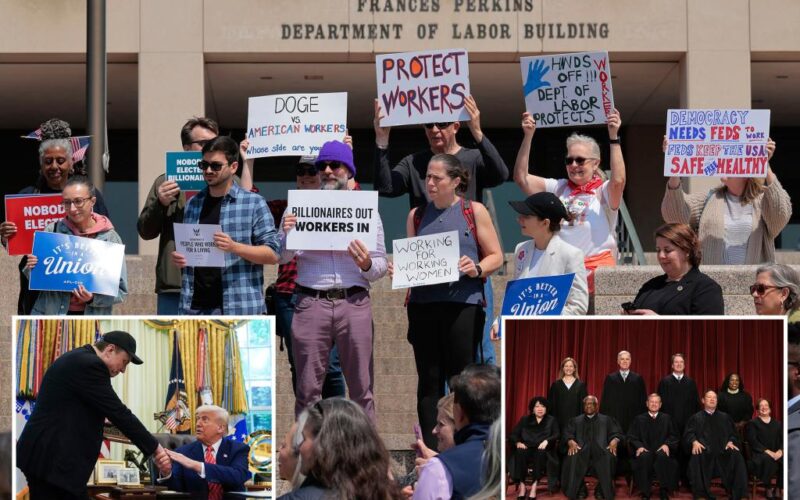The Trump administration pleaded with the Supreme Court on Monday to put the brakes on a lower court ruling that stymied its efforts to carry out mass workforce reductions.
US Solicitor General D. John Sauer ripped the lower court ruling as “flawed” and claimed that it is causing “ongoing and severe harm” to the administration’s efforts to fulfill President Trump’s reforms.
“That injunction rests on the indefensible premise that the President needs explicit statutory authorization from Congress to exercise his core Article Il authority to superintend the internal personnel decisions of the Executive Branch,” Sauer wrote in an emergency petition to the high court.
“The Constitution does not erect a presumption against presidential control of agency staffing, and the President does not need special permission from Congress to exercise core Article II powers.”
Back in February, Trump issued a sweeping executive order to dramatically pare back the federal workforce, and key agencies such as the Office of Personnel Management promptly followed up with more specific instructions to carry out that order.
Last month, Northern District of California Judge Susan Illston, who as appointed by former President Bill Clinton, concluded that Trump lacked the authority to pursue such a dramatic revamp of the federal workforce without congressional say-so.
She specifically paused the administration’s mass reductions in force, or RIFs, at 21 federal agencies as well as other related efforts.
Then, last Friday, in a 2-1 opinion, the Ninth Circuit Court of Appeals in San Francisco rejected a plea from the Trump administration to halt that ruling, rendering the Supreme Court the president’s last recourse.
The appeals court found that Trump’s executive order “far exceeds the President’s supervisory powers under the Constitution.”
Sauer countered that the lower court injunction exceeds the power of the judiciary and that Trump was within his lawful authority to enact such an order.
“The injunction has brought to a halt numerous in-progress RIFs at more than a dozen federal agencies, sowing confusion about what RIF-related steps agencies may take and compelling the government to retain – at taxpayer expense,” Sauer argued.
The Trump administration has been broadly vexed by a slew of universal injunctions from the lower courts that have scuttled some of the president’s key actions and priorities.
Monday’s petition before the high court is the Trump administration’s 18th emergency appeal to the Supreme Court during the president’s second term.
Last month, the Supreme Court declined another Trump administration petition in the same workforce reduction case. In that instance, however, the judge’s prior block was only slated to last two weeks.
Supreme Court justices are currently considering the president’s birthright citizenship case, which has emerged as a proxy for the administration’s effort to claw back lower court powers to pump the brakes on key actions.
A decision in that case is expected to be handed down by the end of the month.








